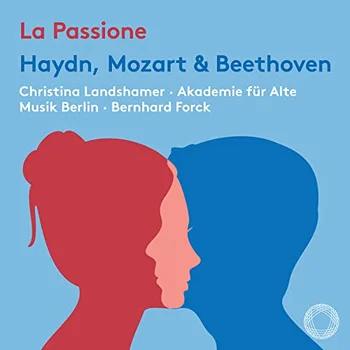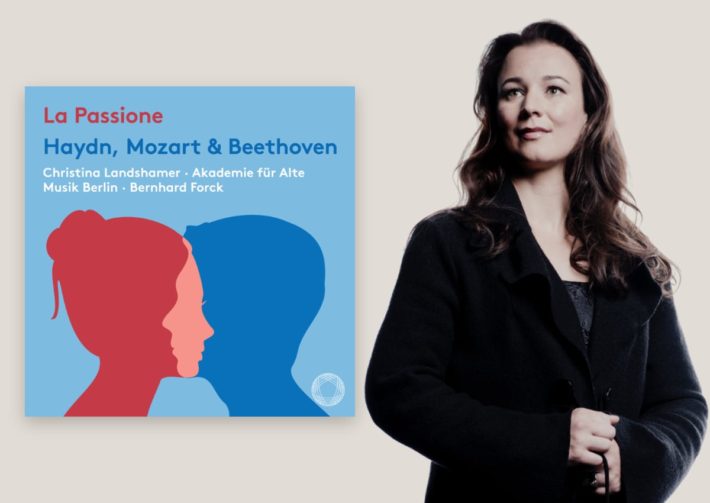Image: © Marco Borggreve
Soprano Christina Landshamer’s new collaboration with period-instrument ensemble Akademie für Alte Musik Berlin explores the omnipresent theme of love in works by Haydn, Beethoven, and Mozart. Immediately interesting is the mix of quintessentially ’emotional’ pieces like Haydn’s F minor Symphony No. 49 (“La Passione”) and lesser known ones such as Beethoven’s “No, non turbati.”

The fine performance of Beethoven‘s short gem of an opera scene, “No, non turbati,” (tracks 5-6) makes us regret that it is not featured more often. In the aria, ‘Ma tu tremi,’ the orchestra brings out the brightness at the heart of the composer’s early Classical style–and with refreshing vigor. Landshamer’s voice, while pleasingly rich, still has a silvery quality. Artistically, her delivery is highly responsive to small aspects in the text: for instance, she exhibits excellent vocal command in the opening phrases to reflect that they are questions. Much of the aria centers on feelings of reassurance, which I found she captures especially well with an air of confidence and unfailing optimism. The final line is not without a bit of irony–something that her deft change in dynamics brings to light.
The Mozart that follows offers a shift in character, with ‘Non temer, amato bene’ (track 8) expressing deep yearning. A side-by-side listen of the Beethoven and Mozart arias shows Landshamer’s artistic versatility. Her ebullient, arching phrases in the humorous Ma tu tremi now give way to charming sincerity in the form of fine legatos and a more delicate feel well-suited to a Mozart aria. The solo violin plays a significant role here: while lovely, I did find it occasionally in competition with the voice.
Haydn’s ‘La Passione’ Symphony has some stiff competition: there’s a fine 2020 recording by soprano/conductor Barbara Hannigan & the Ludwig Orchestra (on modern instruments) that I reviewed back in 2020, or Giovanni Antonini’s 2014 period instrument performance (as part of his Haydn 2032 symphony cycle). Despite its idiomatic elegance, ‘La Passione’ stands out from some of the other Sturm und Drang symphonies for its level of sensitivity. In the opening movement, for instance, two-note phrases are carefully sculpted to portray small, breathless sobs. The Akademie’s interpretation, while nice in its resonance, somehow feels too matter-of-fact. The tempo isn’t outlandishly brisk but is a touch fast: It occasionally felt like I was whisked away to the next phase just as I managed to grasp a nuance of emotion. Antonini’s players really hit the mark in the emotional sense: the sound is sometimes barely above a whisper yet oh-so arresting, thanks to the remarkable bow control. His take has an honest fragility and magic that’s not quite present in the Akademie’s.
Action-packed movements like the Finale (track 12) fare well in how the ensemble handles the intricacy of Haydn’s textures. The repeated notes in the accompaniment are clean and metronomically precise, so the exciting urgency doesn’t wind up becoming frantic and overbearing. Likewise, not a single note in the melody is overlooked–there is enough airspace between even the smallest phrases to prevent any sort of unwanted elision of residual sound. Listeners looking for a slightly more stormy performance, however, might refer to Trevor Pinnock & The English Consort (2000); here, the subito fortes are more robust and the bowing more emphatic.
Roman Hinke’s liner notes follow the path of the programme and offer generous descriptions of the works; listeners will appreciate the easy-to-read, narrative style that eschews dry musical analyses. In their place are insights into historical and stylistic perspectives. I found the sound engineering fairly good (especially with regards to the ensemble), giving plenty of depth to the instrumentalists. I appreciated that the harpsichord was given its due attention when in other recordings, it can often feel overlooked. As for the voice, it does sound up close at times–but this does little to detract from Landshamer’s fine efforts.
On the whole, the performances are intelligently conceived and solidly executed. This, combined with the interesting programming, makes for a wholly satisfying listen. I only wish there was more than just 71 minutes of music, but that time is well-worth it to be savored.
Recommended Comparisons
Herbig | Märzendorfer | Rattle | Fischer
La Passione
Christina Landshamer, Soprano
Akademie für Alte Musik Berlin
Bernhard Force – Concertmaster
Pentatone, CD PTC5186987



















